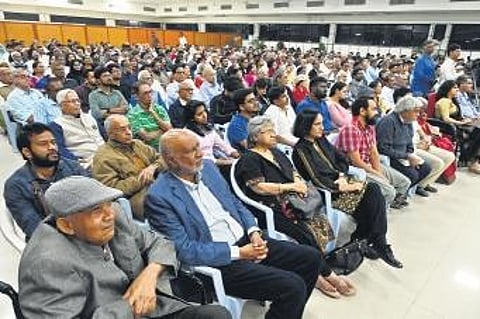

HYDERABAD: Economists Raghuram Rajan and Rohit Lamba introduce their book, ‘Breaking The Mould - Reimagining India’s Economic Future’ in a talk organised by Manthan India at Muffakam Jah College of Engineering recently.
As the reports of Indian economic growth frequently adorn an ‘optimistic’ outlook, the dissenting voices continuously pose relevant questions such as how much of this growth can positively impact the lives of its citizens. Is the global manufacturing sector shifting towards India, poised to provide much-needed employment for the country’s youth? It is also not hidden knowledge that India’s growth is marked by extreme inequality and insufficient job creation. Some contend that India has missed the manufacturing opportunity, asserting that the industry cannot generate jobs at the necessary scale. Alternatively, proponents suggest India should focus on expanding and creating jobs in the services sector, including high-end services. Another viewpoint highlights concerns about India’s governance structures needed to be stronger to oversee a successful economic transformation.
Economists Raghuram Rajan and Rohit Lamba address these perspectives in their latest book, “Breaking the Mould: Reimagining India’s Economic Future.” At a talk organised by Manthan India, they discussed their analysis, offering solutions that aim at investment in human capital, expanding opportunities in high-skilled services, manufacturing centred on innovative products and better governance through decentralisation.
Raghuram Rajan, former governor of the Reserve Bank of India and chief economist at the International Monetary Fund is currently a professor at the University of Chicago Booth School of Business. Rohit Lamba is an assistant professor of economics at Pennsylvania State University and a visiting assistant professor of economics at New York University Abu Dhabi.
Addressing students, experts and citizens of Hyderabad, Professor Rajan explained how India needs to follow the path of innovation and for that, it need not necessarily be obsessed with the idea of manufacturing. Sharing the example of Apple’s iPhone, he said, that Apple dominates the spheres where most of the value is added to the product whereas it outsources its production to Foxconn. That way, it holds top positions on what looks like a smile curve, the topmost parts being design and marketing and the lowest being production in terms of value addition.
“Historically, emerging markets started in manufacturing by competing with the industrial world. As they had to generate a profit by going up the ladder. Today, it’s quite competitive but you can enter the plateaus directly. Today, a lot of value is added by our design, creativity, intellectual property, and some of the marketing and advertising done in India, without us capturing the profits at all. For example, chips. By some metrics, 20% of chip design is done in India.
That’s the plateau. It’s owned by a US company employing Indian workers who do the chip design. So if we want to capture value-adding domain, i.e. the richest parts of the value chain, not only do we have to make the intellectual property, the design, as well as the marketing & finance, but we also need to have the property rights so that the profits stay in India. We’ve got to create Indian chapters in these areas,” Rajan said.
He suggested three major solutions while sharing examples of Indian companies already making their mark in innovation and creativity. He said that investment in human capital by way of improvement in health and education is the first step in achieving this goal.
“About 35% of our children are malnourished, which is a shame for India. In the next couple of decades, when these children become part of the workforce, they will not be able to become productive members,” he added.
The other solutions mentioned improvement in governance through greater decentralisation and more democratic systems that channel the human capital towards innovative processes.